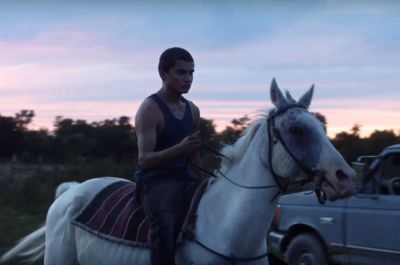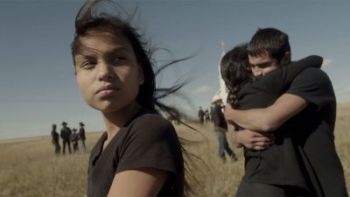
By John Duncan Talbird.
First-time feature writer-director Chloé Zhao’s Songs My Brothers Taught Me opens and closes with the narration of teenage Lakota Indian Johnny Winter (John Reddy). The first image is of him barebacked on a horse, voiceover emotionlessly informing us about the wisdom he’s gained breaking horses: “Anything that runs wild has got something bad in them. You want to leave some of that in there.”
This fierce, beautiful movie has got a lot of wild in it. It’s got both the stunning vistas of its Badlands location and also the rusted-out trucks and doublewides and decrepit ranch homes of its Indian reservation location. It’s very much a product of the postcolonial film era while at the same time hearkening back to the raw and true Neorealism of Italian postwar films with their impoverished locations and amateur actors. The vast majority of faces here are first-time performers with a few welcome returns (like the criminally underutilized Irene Bedard who viewers will remember from the classic Indian indie Smoke Signals (1998)). The narrative is fragmented and impressionist, plot more an accretion of events and images than a forward-moving thing. This will be boring for some. For me, it was refreshing, mainly because of the subtle power of its two principal characters, Johnny and his little sister Jashaun (Jashuan St. John). The other brother from the title (played morosely by Kevin Hunter) is in jail with few lines and little screen time. We are meant to see this as Johnny’s possible/probable pathway. His day job involves selling illicit alcohol on this dry reservation (“The Rez”) which leads to trouble with the local – and better organized – hoods.
The plot, what there is of it, is catalyzed by the death of the kids’ father, apparently the victim of his own alcoholism and a lit cigarette. We return to the burnt-out husk of his house again and again like the visual refrain to a sad song. We also learn at the wake that Johnny and Jashaun are just three of their father’s twenty-five kids, their mother, one of his nine “wives.” We get the sense that many of these kids are meeting for the first time at the funeral, that they have different pathways: some are bull riders, some are boxers, some are drunks, some teetotalers. This event leads to two parallel stories, Johnny’s and Jashaun’s. Johnny, in addition to selling contraband alcohol, is also an aspiring boxer. We see him beaten unconscious in a mismatched boxing match and then never see him box again. His girlfriend, Aurelia (Taysha Fuller), is heading to UCLA in the fall, wants to be a lawyer. Supposedly, Johnny is going to go with her, is going to get “some job,” is going to “live somewhere” while Aurelia lives in the dorm. It’s no surprise that Johnny won’t make that trip, but we wait in quiet tension to discover the reason why: Will he end up in jail with his brother? Or perhaps some destination even more tragic.
 The movie, though, belongs to teen St. John in her film debut. When she discovers that her brother is leaving to head south we see this eleven-year-old struggle with this information, knowing, as she does, that she’ll be all alone with her alcoholic mother. We watch her first sink into depression, getting into her dingy bed in the middle of the day, and then see her overcome this sadness, eventually confronting her brother in a beautiful panorama of wildflower-speckled grasslands surrounded by rocky escarpments. Her anger is spiked with a subtle suffering, tears as natural as the surroundings. Reddy, for his part, reveals a young Indian teen who is struck silent, not to fit any clichéd ideas about taciturn “natives,” but out of a deep shame and guilt as he’s torn between duty toward family and the very American desire to strike out on his own.
The movie, though, belongs to teen St. John in her film debut. When she discovers that her brother is leaving to head south we see this eleven-year-old struggle with this information, knowing, as she does, that she’ll be all alone with her alcoholic mother. We watch her first sink into depression, getting into her dingy bed in the middle of the day, and then see her overcome this sadness, eventually confronting her brother in a beautiful panorama of wildflower-speckled grasslands surrounded by rocky escarpments. Her anger is spiked with a subtle suffering, tears as natural as the surroundings. Reddy, for his part, reveals a young Indian teen who is struck silent, not to fit any clichéd ideas about taciturn “natives,” but out of a deep shame and guilt as he’s torn between duty toward family and the very American desire to strike out on his own.
Cinematographer Joshua James Richards makes his feature debut in this stunningly filmed production with long takes that don’t call attention to themselves and yet allow us to both revel in the natural beauty of this place and also to face the gritty reality of life on “the Rez.” Forest Whitaker, who acts as producer for this film, has continued to help discover and promote interesting American films which are injecting Hollywood with some much-needed diversity, both in the faces on the screen and the kinds of stories that are told. In the last couple years, he’s also acted as producer on the impressive films Dope (2015) and Fruitvale Station (2013), among others.
Songs My Brothers Taught Me is an Indian story told by a Chinese-American woman. As we all know, Hollywood has a gender problem in addition to a racial one, so we can only hope that this is the start of a long career for Zhao who is reminding us that all kinds of stories should be told by all kinds of people. It’s fitting that Johnny, near the end of this film, celebrates his younger sister who appreciates the beauty of the land they live on, who recognizes the importance of community and family, when he says, “My sister sees things that I don’t.”
John Duncan Talbird is the author of the limited edition book of stories, A Modicum of Mankind (Norte Maar) with images by artist Leslie Kerby. His fiction and essays have recently appeared or are forthcoming in Ploughshares, Juked, The Literary Review, Amoskeag, REAL and elsewhere. An English professor at Queensborough Community College, he lives with his wife in Brooklyn.
